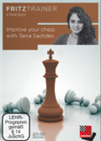“It’s not really my whole life”
At 20, Carissa Yip is already a 2-time U.S. women’s chess champion and ranked 11th among under-20 women players in the world. Notably, she is also enrolled in the prestigious Stanford University, and is convinced that chess is not her one defining quality. In an article published on the Stanford Report on June 28, she explains:
There are so many other things I’m interested in and passionate about. [Chess] has been a profession for the last few years, but it’s not really my whole life, and I don’t want to make it my entire life.
Yip won the national title for the first time in 2021, at 18. Back then she claimed tournament victory with a round to spare, and after drawing her last-round game, she finished the event with 8½/11 points. Clear second place in that edition was obtained by none other than Gulrukhbegim Tokhirjonova, who also fought neck and neck with Yip this time around.
In fact, Tokhirjonova was inches away from reaching a playoff for first place on Tuesday.
Playing white against Ruiyang Yan, Yip lost a game for the first time in the tournament. Tokhirjonova, who entered the round trailing Yip by a half point, thus only needed a draw to catch the 20-year-old. Getting a draw in her double-edged struggle against Jennifer Yu was no trivial task, however.
With around 5 minutes on the clock, Tokhirjonova played the ‘obvious’ move in the position: 50.Bxg7+, when after 50...Kg8 51.Bd4 Black gets the tempo she needed to play 51...Ne2+, with a winning position.
Given the circumstances, finding the correct 50.Rxc2 would have been difficult even for an elite grandmaster. The idea is that after 50...Rxc2 51.Bxg7+ Kg8 52.Qxc2 Kxg7, forcing a queen trade leads to a drawn endgame — e.g. after 53.Qb2+ Kg6 54.Qb6 (diagram).
The ensuing endgame with knight and two pawns against three pawns (with an outside passer on the a-file) is drawn.
 In over 4 hours in front of the camera, Karsten Müller presents to you sensations from the world of endgames - partly reaching far beyond standard techniques and rules of thumb - and rounds off with some cases of with own examples.
In over 4 hours in front of the camera, Karsten Müller presents to you sensations from the world of endgames - partly reaching far beyond standard techniques and rules of thumb - and rounds off with some cases of with own examples.Yu was not flawless in conversion, as she allowed this idea to again appear on the board five moves later. Tokhirjonova missed it again, though, and soon had to resign the game, and the chance to win her first national title.
Nonetheless, kudos to Tokhirjonova for entering such a fighting position — she could not have guessed beforehand that Yip was going to lose with the white pieces!

2022 U.S. women’s chess champion Jennifer Yu | Photo: Lennart Ootes

Carissa Yip has a look at the sharp fight between Yu and Tokhirjonova after losing her game to Ruiyang Yan | Photo: Lennart Ootes
Although all eyes were put on the dramatic fight for first place, the final round of the women’s championship featured a number of exciting games. In fact, all six games ended decisively, with wins for Yan, Yu (as mentioned above), Alice Lee, Tatev Abrahamyan, Nazi Paikidze and Anna Zatonskih.
In the end, Lee, who lost two of her first three games, finished in sole third place. The youngster turned 14 years old last Friday, and is already the second-highest rated woman player in the country!
 On this DVD, well-known Indian WGM Tania Sachdev shows you how to evaluate certain positions and then find the right concepts and plans on the basis of her own games.
On this DVD, well-known Indian WGM Tania Sachdev shows you how to evaluate certain positions and then find the right concepts and plans on the basis of her own games.
Alice Lee | Photo: Lennart Ootes
Round 11 results
Final standings
All games
Abhimanyu beats Aronian
In the open championship, Fabiano Caruana had already secured overall victory with a round to spare. The performance of the rating favourite was nothing short of remarkable, and there was no real threat to his leading position throughout the second half of the tournament.
Caruana’s fellow elite grandmasters Leinier Domiguez and Wesley So had solid performances to finish undefeated in shared second place. Joining them with 6½/11 points was Abhimanyu Mishra, who got to beat none other than Levon Aronian in the final round.
While Dominguez and So each won 2 games and drew 9 times, Abhimanyu was the player to collect the fewest number of draws among the twelve participants. As the second-lowest rated player in the field, the 14-year-old obtained 5 wins, 3 draws and 3 losses in the event.
Abhimanyu saw Aronian unnecessarily giving up a pawn in a complex middlegame.
White is threatening to capture both the knight on g4 and the pawn on c6. Aronian, who had a half-hour advantage on the clock, decided to sacrifice the c-pawn by playing 25...Nf6, when 25...c5 would have kept the material balance — e.g. the game could have continued with 26.hxg4 cxd4 27.Rxd4 Be6 (diagram), and White is only slightly better.
 The Ruy Lopez is one of the oldest openings which continues to enjoy high popularity from club level to the absolute world top. In this video series, American super GM Fabiano Caruana, talking to IM Oliver Reeh, presents a complete repertoire for White.
The Ruy Lopez is one of the oldest openings which continues to enjoy high popularity from club level to the absolute world top. In this video series, American super GM Fabiano Caruana, talking to IM Oliver Reeh, presents a complete repertoire for White.In the game, on the other hand, Abhimanyu grabbed the pawn and showed great composure to convert his advantage into a memorable 45-move win.

Abhimanyu Mishra is ranked 15th among under-20 players, at 14! | Photo: Lennart Ootes
Sam Sevian and Ray Robson also collected full points in the final round, as they beat Andrew Tang and Dariusz Swiercz, respectively.
Sevian and Robson thus caught Hans Niemann in shared fifth place with fifty-percent scores. Niemann had a strong start, but a one-move blunder against Robson and a subsequent loss to Caruana prevented him from remaining in the fight for first place.

Sam Sevian | Photo: Lennart Ootes

Three-time U.S. chess champion Fabiano Caruana | Photo: Lennart Ootes
Round 11 results
Final standings
All games
Links
























